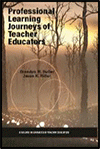
Professional Learning Journeys of Teacher Educators
Edited by:
Brandon M. Butler, Old Dominion University
Jason K. Ritter, Duquesne University
A volume in the series: Advances in Teacher Education. Editor(s): Diane Yendol-Hoppey, University of North Florida. David T. Hoppey, University of North Florida. Jennifer L. Snow, Boise State University. Jennifer Jacobs, University of South Florida.
Published 2024
It is clear that teacher educators have ongoing professional learning and development needs. Chief among these are continuing to learn about content developments and pedagogical practices useful for teaching a range of PK-12 students in varying contexts; developing reflective competencies and sets of practices useful for teaching teacher candidates about teaching; effectively balancing teaching commitments with institutional expectations for scholarship and service; and forging useful understandings of identity across the spectrum of teacher educator responsibility and development over time, including taking on managerial or administrative roles. Working in institutions largely devoid of formal support mechanisms, teacher educators are often left on their own to meet these needs and subsequently must create or seek out opportunities for their ongoing growth. This volume explores in greater depth how exactly teacher educators engage in professional learning and development across their career trajectories.
University-based teacher educator learning occurs in a range of settings and across the career span. Contributors to this volume describe university-based teacher educator learning spaces focused on their ongoing professional learning. Such spaces include teacher educator communities of practice, critical friendships, self-study learning groups, faculty learning groups, co-mentoring, and institutionally sponsored professional learning spaces.
CONTENTS
Introduction: Framing Teacher Educator Learning and Development: An Introduction, Jason K. Ritter and Brandon M. Butler. PART I: PURPOSEFUL INITIATIVES AND COLLABORATIONS AS TEACHER EDUCATOR PROFESSIONAL DEVELOPMENT. Structures of Support for the Ongoing Professional Development of Teacher Educators, Sherry Dismuke and Jennifer Snow. Professional Development for University-Based Teacher Educators: A Perspective on Faculty Learning Communities, Olga De Jesus-Diaz. Narrative Inquiry of Teacher Educators’ Self-Directed Professional Learning Spaces: Three Pillars and a Five-Phase Cycle Model, Aidong Zhang and Carrie Cutler. Collaborative Action Research: A Learning Space for Teacher Educators, Grace H. C. Huang, Mary Gove, and Diane G. Corrigan. A Peer-Led-Teaming Approach to Improving Science Teacher Educators’ Efforts in Internationalizing Science Teacher Preparation Within Rural-Serving Programs, Gayle A. Buck, Vesna Dimitrieska, and Valarie L. Akerson. PART II: LEARNING COMMUNITIES AS TEACHER EDUCATOR PROFESSIONAL DEVELOPMENT. Supervisors as Creators of Teacher Educator Community of Practice, Lisa Sullivan, Rebecca Ambrose, Heather Ballinger, Cheryl Forbes, Victoria Harvey, Soleste Hilberg, Andrew Hood, Jane Kim, Johnnie Wilson, and Evelyn Young. “I am More Intentional Now in My Teaching”: Growing as Teacher Educators Through a Self-Study Community of Practice, Marliese R. Peltier, Roya Q. Scales, Courtney Shimek, Elizabeth M. Bemiss, Stephanie G. Davis, and Ann Van Wig. Taking Matters Into Our Own Hands: Factors Affecting the Utility and Longevity of a Faculty Self-Study Learning Group, Jason K. Ritter and Malimi Kazi. Moving From Doctoral Student to Teacher Educator Faculty in Critical Collaboration: Carving Out an Expansive Learning Space for Innovation in Research and Practice, Allison L. Freed, Lacey D. Huffling, Aerin W. Benavides, and Hannah K. Miller. PART III: MENTORING AND CRITICAL FRIENDSHIPS AS TEACHER EDUCATOR PROFESSIONAL DEVELOPMENT. A Long Conversation: Professional Learning Across Time in Teacher Education, Susan R. Adams and Ryan Flessner. Co-Mentoring: Supporting One Another Into, Through and Beyond Administrative Assignments in Teacher Education, Valerie A. Allison, Laura C. Haniford, and Laurie A. Ramirez. Learning From Field Observations and Critical Friends, Yuankun Yao, Dawna Lisa (Buchanan) Butterfield, and Matt Thomas. Black Male Critical Friendships: Intersectional Learning Spaces for Teacher Educators, Shawn S. Savage and Shane A. Smith. Learning From One Another: Growing Critical Friendships Across Disciplines to Develop Our Professional Identities as Science Teacher Educators, Lacey Huffling, Heather Scott, Asli Aslan, Kelly Moore, Miranda Simmons, and Natalie Sumner. PART IV: CRITICALLY-ORIENTED TEACHER EDUCATOR PROFESSIONAL DEVELOPMENT. A Team’s Journey Toward Becoming Anti-Racist/Anti-Oppressive Teacher Educators, Michael Occhino, Eleni Duret, Cynthia Callard, Jennifer Kruger, and Michael Daley. Seeking to Unsettle and Break Through Whiteness: Enacting Self-Study to Engage in Antiracist Pedagogy as Mathematics Teacher Educators, Dawn M. Woods, Courtney Baker, Robin K. Anderson, Sara Donaldson, and Melissa Troudt. Learning to Do Better: Mathematics Teacher Educators Striving for Equity and Justice, Stefanie D. Livers, Craig J. Willey, Megan Burton, Johanna L. Massey, Natalie Odom Pough, and Diana Piccolo. “So, Your Name is Not Ninja”: Coming Full Circle as a Teacher Educator for Belonging, E. J. Bahng. Biographies.
-
Paperback979-8-88730-496-0
Web price: $45.04 (Reg. 52.99)
-
Hardcover979-8-88730-497-7
Web price: $80.74 (Reg. 94.99)
- eBook979-8-88730-498-4

- EDU053000 - EDUCATION: Training & Certification
- EDU046000 - EDUCATION: Professional Development
- EDU001020 - EDUCATION: ADMINISTRATION: Elementary & Secondary
-
 (Re)Designing Programs:
A Vision for Equity-Centered, Clinically Based Teacher Preparation
(Re)Designing Programs:
A Vision for Equity-Centered, Clinically Based Teacher Preparation
-
 Collaboration, Narrative, and Inquiry That Honor the Complexity of Teacher Education
Collaboration, Narrative, and Inquiry That Honor the Complexity of Teacher Education
-
 Cultivating Democratic Literacy Through the Arts
Guiding Preservice Teachers Towards Innovative Learning Spaces in ELA Classrooms
Cultivating Democratic Literacy Through the Arts
Guiding Preservice Teachers Towards Innovative Learning Spaces in ELA Classrooms
-
 Exemplary Clinical Models of Teacher Education
Exemplary Clinical Models of Teacher Education
-
 Outcomes of High-Quality Clinical Practice in Teacher Education
Outcomes of High-Quality Clinical Practice in Teacher Education
-
 Pathways Into Teacher Education
Profiles of Emerging Teacher Educator Development
Pathways Into Teacher Education
Profiles of Emerging Teacher Educator Development
-
 Preparing the Next Generation of Teacher Educators for Clinical Practice
Preparing the Next Generation of Teacher Educators for Clinical Practice

